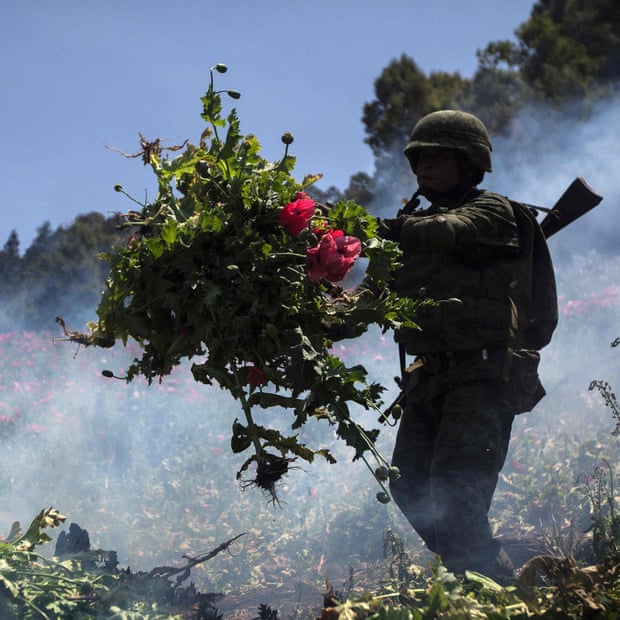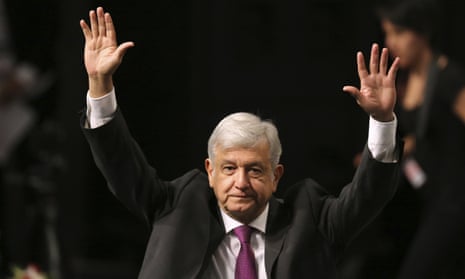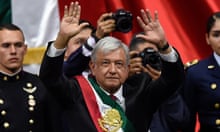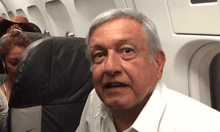A leading Mexican presidential candidate has been accused of wanting to explore a deal with the devil in an attempt to bring peace to the country.
Speaking in the violence-wracked southern state of Guerrero this weekend, Andrés Manuel López Obrador floated the idea of an amnesty for drug cartel kingpins, saying he wanted a dialogue on the drug war that has cost the country an estimated 200,000 lives over the last decade.
Quick GuideMexico's war on drugs
Show

Why did Mexico launch its war on drugs?
On 10 December 2006, Felipe Calderón launched Mexico’s war on drugs by sending 6,500 troops into his home state of Michoacán, where rival cartels were engaged in tit-for-tat massacres.
Calderón declared war eight days after taking power – a move widely seen as an attempt to boost his own legitimacy after a bitterly contested election victory. Within two months, around 20,000 troops were involved in operations.
What has the war cost so far?
The US has donated at least $1.5bn through the Merida Initiative since 2008, while Mexico spent at least $54bn on security and defence between 2007 and 2016. Critics say that this influx of cash has helped create an opaque security industry open to corruption.
But the biggest costs have been human: since 2007, over 250,000 people have been murdered, more than 40,000 reported as disappeared and 26,000 unidentified bodies in morgues across the country. Human rights groups have also detailed a vast rise in human rights abuses including torture, extrajudicial killings and forced disappearances by state security forces.
Peña Nieto claimed to have killed or detained 110 of 122 of his government's most wanted narcos. But his biggest victory – and most embarrassing blunder – was the recapture, escape, another recapture and extradition of Joaquín “El Chapo” Guzmán, leader of the Sinaloa cartel.
Mexico’s decade-long war on drugs would never have been possible without the injection of American cash and military cooperation under the Merida Initiative. The funds have continued to flow despite indisputable evidence of human rights violations.
Under new president Andrés Manuel López Obrador, murder rates are up and a new security force, the Civil Guard, is being deployed onto the streets despite campaign promises to end the drug war.
What has been achieved?
Improved collaboration between the US and Mexico has resulted in numerous high-profile arrests and drug busts. Officials say 25 of the 37 drug traffickers on Calderón’s most-wanted list have been jailed, extradited to the US or killed, although not all of these actions have been independently corroborated.
The biggest victory – and most embarrassing blunder – under Peña Nieto’s leadership was the recapture, escape and another recapture of Joaquín “El Chapo” Guzmán, leader of the Sinaloa cartel.
While the crackdown and capture of kingpins has won praise from the media and US, it has done little to reduce the violence.
“If it is necessary … we will talk about granting amnesty so long as the victims and their families are willing,” he said.
He later told reporters: “We’ll propose it. I’m analyzing it. What I can say is that we will leave no issue without discussion if it has to do with peace and tranquility.”
The comments caused condemnation from López Obrador’s opponents in the political and business classes – many of whom are unnerved by a surge in support for the populist leftwinger.
But his comments also brought accusations of extreme insensitivity, as drug cartels have been responsible for horrific crimes against rivals and innocent bystanders. Guerrero itself has been badly hit by a war for control of the opium poppy and heroin industries, and López Obrador made the remarks in a town where violence is so severe that his own political party, Morena, has still not been able to find a candidate.
“I would hope they never kidnap, torture, kill, disappear and burn [his] loved ones,” José Díaz Navarro, whose brother was kidnapped and killed in the area, told El Universal. “We’ll see if after this he would come to Guerrero to ask them for forgiveness.”
The proposal came as violence unleashed by a decade-long drug cartel crackdown shows few signs of slowing: Mexico recently registered its most murderous month in memory, with 2,371 homicides recorded in October.
And supporters of AMLO (as López Obrador is known) wondered aloud why the comments stirred such outrage in a country where politicians are widely seen as working hand-in-glove with the narcos.
Others argued that the proposal at least offered an alternative to the current government strategy, which has depended heavily on deploying soldiers who have themselves been accused of grave human rights violations.
“For 12 years our country has undergone thousands of cycles of vengeance. It’s not a bad thing to sit back and think about how more soldiers and more war will only perpetuate this,” tweeted Andrés Lajous, an academic.
Political maneuvering has already begun for the 1 July 2018 presidential election, but none of the parties or potential candidates have made curbing the violence a central plank of their platform. . Analysts say politicians see little profit in focusing on an issue with no easy solutions.
But AMLO’s comments also prompted uneasy comparisons with the so-called pax mafiosa under which the ruling Institutional Revolutionary Party (PRI) allegedly formed pacts with cartel bosses curtail violence.
Such a deal would prove impossible, however, as the country’s drug cartels have splintered, leaving few big bosses left to negotiate with.
“It would not do much to stop the ongoing violence,” said Tom Long, international relations professor at the University of Warwick. “The market and the rewards would continue to exist, and different groups would continue to compete – often violently – over that market.”
López Obrador leads early polls, with a recent survey in the newspaper Reforma putting him 14 points ahead of the likely PRI candidate, the former finance minister José Antonio Meade.
When he took office five years ago, the PRI president Enrique Peña Nieto promised to calm the country and combat the crimes affecting ordinary people. He mostly avoided talking about cartel killings and violence and instead preferred to talk up an agenda of economic reforms.
Some said the outrage at AMLO pointed in the wrong direction.
“I think it’s very revealing of the media bias that they’re dedicating such time to this,” said Viridiana Ríos, scholar at the Wilson Centre, a Washington thinktank. “The true story isn’t what AMLO wants to do, rather what Peña Nieto has done so that we’ve arrived in this situation.”










